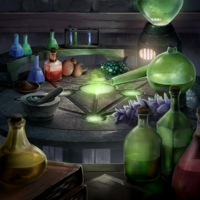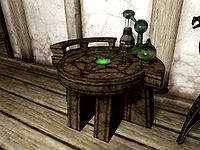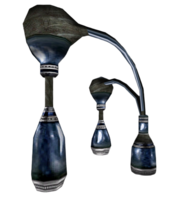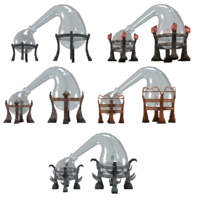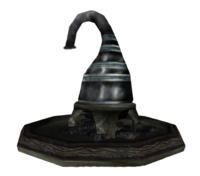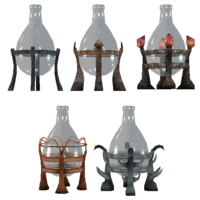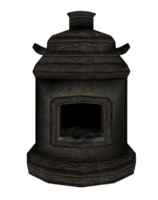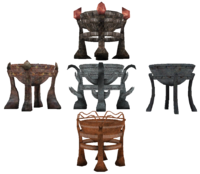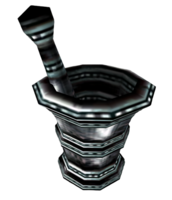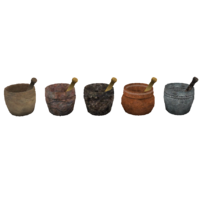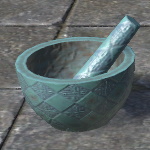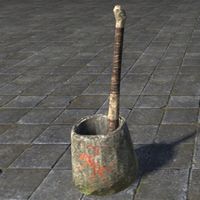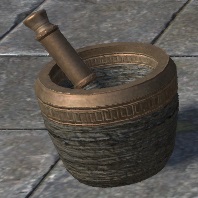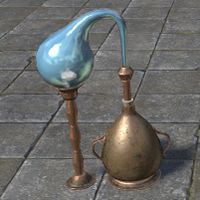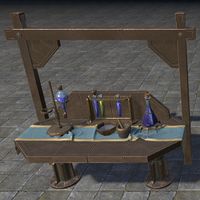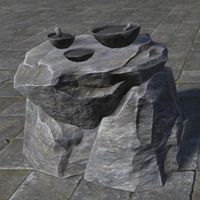Lore:Alchemy
The Alchemy section is a listing of all alchemical ingredients found in the world of Tamriel. Each entry in this index provides a quick reference to the effects and appearance of ingredients in the games. For more information about the flora and fauna that most ingredients originate from, see their respective indices.
Alchemy[edit]
Alchemy is the act of mixing, boiling, and distilling various substances to obtain their chemo-magical properties and create potions and poisons. Potions are usually imbibed orally and usually grant the imbiber with positive effects. Poisons are introduced into the target's bloodstream by pouring it onto a weapon and attacking the target with it and usually gives the target negative effects.[1]
Alchemical ingredients include extracts from plants, animals, undead, and Daedra.[2] Certain ingredients are very valuable to alchemists due to their rarity, many of which are extracts from Daedric creatures.[3] Prospective alchemists often need to experiment with ingredients to gauge what effects can be created, usually by eating samples of ingredients. This practice is referred to as wortcraft.[4] Stationary alchemical stations are often used for the preparation of potions.
In the Iliac Bay, they were often utilized by the temple clergy and the elusive Dark Brotherhood as a service to their members.[5] In Skyrim, such stations were not only used by apothecaries but also installed by court wizards and even some taverns.[6] Some landowners may also have an alchemy laboratory in their own homes. In contrast, within Cyrodiil and Morrowind it was far more common for a smaller travel apparatus to be used by alchemists. These portable laboratories had four components:
- Mortar and Pestle: used for grinding the ingredients together into a paste to be boiled, required for potion brewing
- Retort: used for distilling the brew, increases the magnitude of the potion's positive effects, optional for potion brewing.
- Calcinator: used to increase all effects of the brew, both positive and negative, optional for potion brewing.
- Alembic: also distills the brew, used to decrease its negative effects, optional for potion brewing
Around 4E 8, tests for discerning an ingredient's four "virtues" (primary, secondary, tertiary, and quaternary) were developed.[7]:41
Uses[edit]
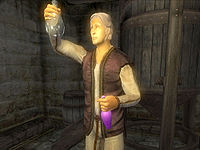
Asliel Direnni formulated alchemy into an art and science, and even pioneered a way to combat the spread of vampirism by making a potion which poisoned the victim's blood and killed vampires who attempted to feast on them. The formula to make such potions has since been lost to history.[8] It is possible to attain a form of vampirism, a condition normally associated with Molag Bal, by brewing a form of the virus. Such an application of the art of alchemy was used to treat a bloodborne disease during the Interregnum.[9][10]
Gyron Vardengroet managed to create and use a potion of immortality. Unfortunately, his process in creating the potion of immortality required him to test multiple different candidates. The successful potion did not give him any obvious sign that he was no longer aging besides his realization after several years that he had not aged. Thus, he is unsure of which of the many potions he took was the correct one and continued looking for the correct combination.[11]
Alchemy has been combined with witch magic to form arcane storms.[12]
Skinmail is an armor of myth and legend created after decades' worth of attentive work in both alchemy and enchantment. They are the result of vials of experimental liquids, which, upon contact with skin, will harden it and produce plate-like coverings to the wearer's liking. Skinmail was created by an Altmer alchemist, who performed profane experiments on live subjects to reach the results they desired.[13]
The process of creating Stone Husks, vessels capable of freeing souls from Coldharbour, also involves alchemy.[14] Transformations can be achieved using potions. The mad alchemist Arkasis created potions that allowed non-lycanthropes to transform into werewolf behemoths. These potions did not infect the subjects with actual lycanthropy.[15][16]
Alchemy in the Games[edit]
- TES: Arena: There are potions, but none can be made.
- TES II: Daggerfall: Potions can be made, but only with the aid of a Potion Maker.
- An Elder Scrolls Legend: Battlespire: There are potions, but none can be made.
- TES Adventures: Redguard: Potions are sublimated with ingredients, though most combinations have no effect.
- TES III: Morrowind: Potions can be made with the proper apparatuses: mortar and pestles, alembics, retorts, and calcinators.
- TES Travels: Dawnstar: Among the Magic Items are a handful of potions, but none can be made.
- TES Travels: Shadowkey: Among the Consumables are some potions, but none can be made.
- TES IV: Oblivion: Potions and poisons can be made with the proper apparatus: mortar & pestles, alembics, retorts, and calcinators.
- TES V: Skyrim: Potions and poisons can be made, but only at an alchemy lab.
- The Elder Scrolls Online: Potions and poisons can be made, but only at an alchemist's lab.
- The Elder Scrolls: Blades: Potions and poisons can be made, but only with Lea Jeanne or an alchemist.
See Also[edit]
- For game-specific alchemy information, see the Morrowind, Oblivion, Skyrim, Online, and Blades articles.
- For Game-specific ingredient information see the Daggerfall, Redguard, Morrowind, Shadowkey, Oblivion, Skyrim, Online, and Blades articles.
Books[edit]
- The Alchemist's Formulary — Instructions for some of the common potions made around Morrowind
- Alchemy: Discovering Traits by Defessus Lector — A guide to basic alchemy
- Alchemy For My Apprentice by You Know Who — A master alchemist instructs an apprentice on the basics of potion-making
- The Cake and the Diamond by Athyn Muendil — An alchemist tricks a thief!
- Calcinator Treatise — Argonian secrets of proper Calcinator positioning
- De Rerum Dirennis by Vorian Direnni — Tales about a creator of Alchemy Science
- Discomforts of War by Robier Douare, Alchemist — Alchemical advice to protect against common health threats
- Fundaments of Alchemy by Alyandon Mathierry — A fundamental primer on Alchemy
- A Game at Dinner by An Anonymous Spy — A spy's observations upon poison making and a dinner party
- Herbalist's Guide to Skyrim by Agneta Falia — A description of alchemy ingredients found in Tamriel's northernmost province, Skyrim
- The Nirnroot Missive by Sinderion — A description of the enigmatic plant called Nirnroot
- Sinderion's Field Journal by Sinderion — A detailed account of an alchemist's obsession with Nirnroot
- Song of the Alchemists by Marobar Sul — Book 5 of an incomplete series of fictional stories about the Dwemer
- Special Flora of Tamriel by Hardin the Herbalist — A list of the rare plants of Tamriel
Gallery[edit]
-
Hagraven alchemical altar
References[edit]
- ^ Alchemy For My Apprentice — You Know Who
- ^ Agents and Reagents: The Bounty of Mundus
- ^ Herbalist's Guide to Skyrim — Agneta Falia
- ^ Fundaments of Alchemy — Alyandon Mathierry
- ^ Potion availability in Daggerfall
- ^ Alchemy lab locations in Skyrim
- ^ Keyes, Greg. The Infernal City. Del Rey Books, 2009.
- ^ De Rerum Dirennis — Vorian Direnni
- ^ Norasea's dialogue during Murder In Lillandril in ESO: Summerset
- ^ Haladan's Research Journal — Haladan
- ^ The Sage — Aegrothius Goth
- ^ On Harrowstorms — Fennorian of House Ravenwatch
- ^ Armor of Myth and Legend — Aurelienne Dulroi
- ^ Fennorian's dialogue during Daughter of the Wolf in ESO: Greymoor
- ^ Werewolf Behemoth transformation mechanic within Stone Garden in ESO: Stonethorn
- ^ Meet the Character - Arkasis — Adandora, Chronicler-at-Large
|
||||||||
